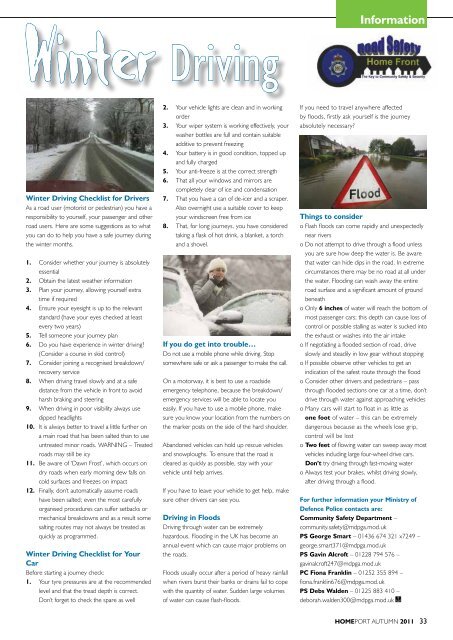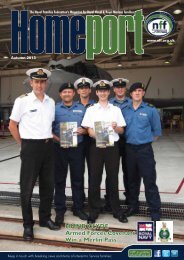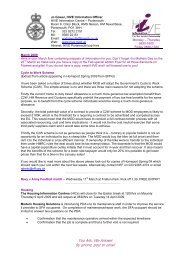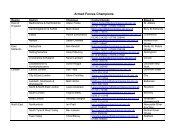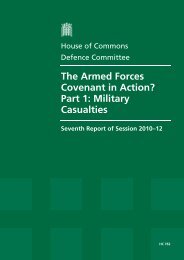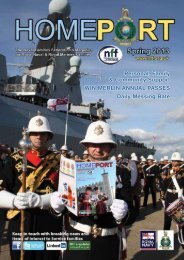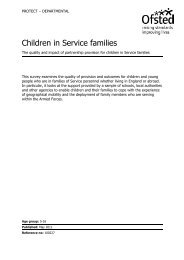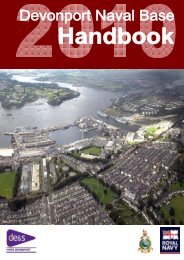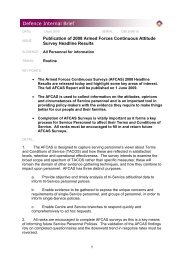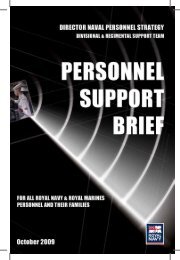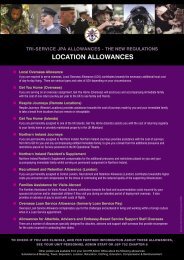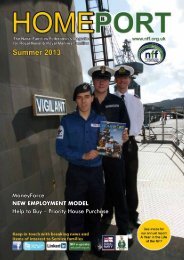Information - NFF
Information - NFF
Information - NFF
You also want an ePaper? Increase the reach of your titles
YUMPU automatically turns print PDFs into web optimized ePapers that Google loves.
Winter Driving<br />
<strong>Information</strong><br />
Winter Driving Checklist for Drivers<br />
As a road user (motorist or pedestrian) you have a<br />
responsibility to yourself, your passenger and other<br />
road users. Here are some suggestions as to what<br />
you can do to help you have a safe journey during<br />
the winter months.<br />
1. Consider whether your journey is absolutely<br />
essential<br />
2. Obtain the latest weather information<br />
3. Plan your journey, allowing yourself extra<br />
time if required<br />
4. Ensure your eyesight is up to the relevant<br />
standard (have your eyes checked at least<br />
every two years)<br />
5. Tell someone your journey plan<br />
6. Do you have experience in winter driving?<br />
(Consider a course in skid control)<br />
7. Consider joining a recognised breakdown/<br />
recovery service<br />
8. When driving travel slowly and at a safe<br />
distance from the vehicle in front to avoid<br />
harsh braking and steering<br />
9. When driving in poor visibility always use<br />
dipped headlights<br />
10. It is always better to travel a little further on<br />
a main road that has been salted than to use<br />
untreated minor roads. WARNING – Treated<br />
roads may still be icy<br />
11. Be aware of ‘Dawn Frost’, which occurs on<br />
dry roads when early morning dew falls on<br />
cold surfaces and freezes on impact<br />
12. Finally, don’t automatically assume roads<br />
have been salted; even the most carefully<br />
organised procedures can suffer setbacks or<br />
mechanical breakdowns and as a result some<br />
salting routes may not always be treated as<br />
quickly as programmed.<br />
Winter Driving Checklist for Your<br />
Car<br />
Before starting a journey check:<br />
1. Your tyre pressures are at the recommended<br />
level and that the tread depth is correct.<br />
Don’t forget to check the spare as well<br />
2. Your vehicle lights are clean and in working<br />
order<br />
3. Your wiper system is working effectively, your<br />
washer bottles are full and contain suitable<br />
additive to prevent freezing<br />
4. Your battery is in good condition, topped up<br />
and fully charged<br />
5. Your anti-freeze is at the correct strength<br />
6. That all your windows and mirrors are<br />
completely clear of ice and condensation<br />
7. That you have a can of de-icer and a scraper.<br />
Also overnight use a suitable cover to keep<br />
your windscreen free from ice<br />
8. That, for long journeys, you have considered<br />
taking a flask of hot drink, a blanket, a torch<br />
and a shovel.<br />
If you do get into trouble…<br />
Do not use a mobile phone while driving. Stop<br />
somewhere safe or ask a passenger to make the call.<br />
On a motorway, it is best to use a roadside<br />
emergency telephone, because the breakdown/<br />
emergency services will be able to locate you<br />
easily. If you have to use a mobile phone, make<br />
sure you know your location from the numbers on<br />
the marker posts on the side of the hard shoulder.<br />
Abandoned vehicles can hold up rescue vehicles<br />
and snowploughs. To ensure that the road is<br />
cleared as quickly as possible, stay with your<br />
vehicle until help arrives.<br />
If you have to leave your vehicle to get help, make<br />
sure other drivers can see you.<br />
Driving in Floods<br />
Driving through water can be extremely<br />
hazardous. Flooding in the UK has become an<br />
annual event which can cause major problems on<br />
the roads.<br />
Floods usually occur after a period of heavy rainfall<br />
when rivers burst their banks or drains fail to cope<br />
with the quantity of water. Sudden large volumes<br />
of water can cause flash-floods.<br />
If you need to travel anywhere affected<br />
by floods, firstly ask yourself is the journey<br />
absolutely necessary?<br />
Things to consider<br />
o Flash floods can come rapidly and unexpectedly<br />
near rivers<br />
o Do not attempt to drive through a flood unless<br />
you are sure how deep the water is. Be aware<br />
that water can hide dips in the road. In extreme<br />
circumstances there may be no road at all under<br />
the water. Flooding can wash away the entire<br />
road surface and a significant amount of ground<br />
beneath<br />
o Only 6 inches of water will reach the bottom of<br />
most passenger cars; this depth can cause loss of<br />
control or possible stalling as water is sucked into<br />
the exhaust or washes into the air intake<br />
o If negotiating a flooded section of road, drive<br />
slowly and steadily in low gear without stopping<br />
o If possible observe other vehicles to get an<br />
indication of the safest route through the flood<br />
o Consider other drivers and pedestrians – pass<br />
through flooded sections one car at a time, don’t<br />
drive through water against approaching vehicles<br />
o Many cars will start to float in as little as<br />
one foot of water – this can be extremely<br />
dangerous because as the wheels lose grip,<br />
control will be lost<br />
o Two feet of flowing water can sweep away most<br />
vehicles including large four-wheel drive cars.<br />
Don’t try driving through fast-moving water<br />
o Always test your brakes, whilst driving slowly,<br />
after driving through a flood.<br />
For further information your Ministry of<br />
Defence Police contacts are:<br />
Community Safety Department –<br />
community.safety@mdpga.mod.uk<br />
PS George Smart – 01436 674 321 x7249 –<br />
george.smart371@mdpga.mod.uk<br />
PS Gavin Alcroft – 01228 794 576 –<br />
gavinalcroft247@mdpga.mod.uk<br />
PC Fiona Franklin – 01252 355 894 –<br />
fiona.franklin676@mdpga.mod.uk<br />
PS Debs Walden – 01225 883 410 –<br />
deborah.walden300@mdpga.mod.uk<br />
HOMEPORT AUTUMN 2011 33


